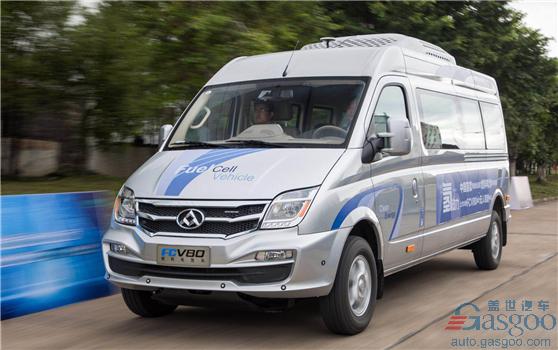SAIC Maxus FCV80 costs RMB 300,000

Shanghai (Gasgoo)- At Auto Guangzhou 2017, new energy vehicles that are environment-friendly and clean energy-powered represented a future direction in auto industry. While the mainstream companies were still on the fence, SAIC MAXUS launched its blockbuster product, FCV80 fuel-cell light passenger vehicle, which had been developed for three years. The official price of FCV80 was RMB 1.3 million, but the buyer may only pay RMB 300 thousand given the national and local subsidies.
Lan Qingsong, the vice chairman of SAIC, expressed his idea that the fuel-cell vehicle technology and its application in industrial and military areas have been fairly mature, and our country needs clean energy to address the environment issues brought by the development of China's economy and the changes of its population. Hydrogen fuel has been widely recognized as the cleanest energy, which only generates H2O during fuelling process and does not cause any pollution. Following the global trend, hydrogen fuel has also been considered as a final solution to the vehicle industry.
However, except Hyundai, Toyota and Honda, there is no any other company that reveals its product planning concerning hydrogen fuel cell car development.
With all-electric vehicles as the mainstream new energy vehicles in Auto Guangzhou 2017, SAIC MAXUS displayed FCV80. For this bold move, Hao Jingxian, deputy director and chief engineer of technology center of SAIC Motor said, "SAIC has three technology lines, and we do not expect a corner overtaking in new energy vehicles development. We have our strengths, especially strength in technology development. In areas of fuel-cell, all-electric and hybrid vehicle development, we are internationally competent in both differentiation and technology advantages. "
However, technology alone cannot leverage the whole hydrogen fuel cell car market. Especially at present when the hydrogen filling stations are underdeveloped, only 7 stations even under the subsidy policy of governments, and the technology regulations and standards haven't been well established, the promotion and popularization of hydrogen fuel-cell cars are facing significant challenges.
As for the commercialization of fuel-cell cars, Lan Qingsong believes optimum business model will come out only after a relative larger scale. After all, industrialization requires proper business scale. Millions of mileage and feedbacks from users can help to update the technology.
Apparently, SAIC MAXUS is fully aware of the challenges of commercialization of hydrogen fuel-cell cars, yet it still shows great confidence in the future development. This may come from its increasing sales. According to latest statistics, the October sales of SAIC MAXUS grew by 92% year on year, and the total sales from January to October reached a record of 53,556, with a year-on-year growth of 44%, surpassing the annual sales of 2016.
Gasgoo not only offers timely news and profound insight about China auto industry, but also help with business connection and expansion for suppliers and purchasers via multiple channels and methods. Buyer service: buyer-support@gasgoo.com Seller Service: seller-support@gasgoo.com
All Rights Reserved. Do not reproduce, copy and use the editorial content without permission. Contact us: autonews@gasgoo.com.